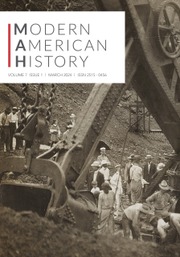Article contents
Tammany Hall and the Machine Style in Black Politics
Published online by Cambridge University Press: 23 February 2021
Extract
“I seen my opportunities and I took ’em,” explained George Washington Plunkitt speaking to the journalist William L. Riordan at the dawn of the twentieth century. For many college students, William Riordan's collection of musings and reminiscences from New York State Senator Plunkitt, delivered at a shoeshine stand on Manhattan's West Side, offers a definitive introduction to the history of urban machine politics. Plunkitt of Tammany Hall: A Series of Very Plain Talks on Very Practical Politics, first published in 1905, has become a ubiquitous text, frequently assigned in political science courses and excerpted in U.S. history source books. Plunkitt's reflections, while entertaining, present a transactional and opportunistic form of political practice. He famously differentiates between honest graft and dishonest graft; insists that showing up at fires to help victims is key to holding your district; declares the Irish to be natural born leaders; and derides reformers as “mornin’ glories.” He rages against the key urban reform project of the era, civil service examinations, as “the curse of the nation,” amounting to “a lot of fool questions about the number of cubic inches of water in the Atlantic and the quality of sand in the Sahara desert.” Civil service exams blocked machine politicians from distributing jobs to loyal followers, which in the case of the New York Democratic machine typically meant recently arrived Irish immigrants. As Plunkitt explains, “The Irishman is grateful. His one thought is to serve the city which gave him a home. He has this thought even before he lands in New York, for his friends here often have a good place in one of the city's departments picked out for him while he is still in the old country.” Plunkitt's characterization of the linkage between migrant arrival and municipal work points to the central role that access to city payrolls played in the economic and political history of the New York Irish. Arguably, the only other urban group that relied as heavily on city jobs for economic mobility has been African Americans.
- Type
- Into the Stacks
- Information
- Copyright
- Copyright © The Author(s), 2021. Published by Cambridge University Press
References
1 Riordan, William L., Plunkitt of Tammany Hall: A Series of Very Plain Talks on Very Practical Politics (New York, 2015), 11Google Scholar.
2 Ibid., 30.
3 On white ethnics and machine politics, see, for example, Moses, Paul, An Unlikely Union: The Love-Hate Story of New York's Irish and Italians (New York, 2015)Google Scholar; Czitrom, Daniel, “Underworlds and Underdogs: Big Tim Sullivan and Metropolitan Politics in New York, 1889–1913,” Journal of American History 78, no. 2 (Sep. 1991), 536–58CrossRefGoogle Scholar.
4 Walter, John C., The Harlem Fox: J. Raymond Jones and Tammany Hall, 1920–1970 (Albany, NY, 1989), 247Google Scholar.
5 Golway, Terry, Machine Made: Tammany Hall and the Creation of Modern American Politics (New York, 2014)Google Scholar.
6 Walter, Harlem Fox, 37.
7 Ibid., 46.
8 Riordan, Plunkitt of Tammany Hall, 9.
9 Walter, Harlem Fox, 50.
10 Ibid., 51.
11 Ibid., 52.
12 Ibid., 80.
13 Golway, Machine Made, 154.
14 Walter, Harlem Fox, 82.
15 Ibid., 247.
16 Ibid., 245.
- 1
- Cited by



